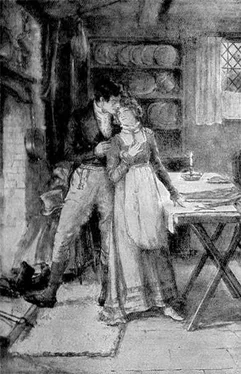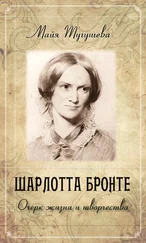"A precious gift! I have not laughed since they shot me till now."
"Do you suffer pain, Robert?"
"Not so much pain now; but I am hopelessly weak, and the state of my mind is inexpressible—dark, barren, impotent. Do you not read it all in my face? I look a mere ghost."
"Altered; yet I should have known you anywhere. But I understand your feelings; I experienced something like it. Since we met, I too have been very ill."
" Very ill?"
"I thought I should die. The tale of my life seemed told. Every night, just at midnight, I used to wake from awful dreams; and the book lay open before me at the last page, where was written 'Finis.' I had strange feelings."
"You speak my experience."
"I believed I should never see you again; and I grew so thin—as thin as you are now. I could do nothing for myself—neither rise nor lie down; and I could not eat. Yet you see I am better."
"Comforter—sad as sweet. I am too feeble to say what I feel; but while you speak I do feel."
"Here I am at your side, where I thought never more to be. Here I speak to you. I see you listen to me willingly—look at me kindly. Did I count on that? I despaired."
Moore sighed—a sigh so deep it was nearly a groan. He covered his eyes with his hand.
"May I be spared to make some atonement."
Such was his prayer.
"And for what?"
"We will not touch on it now, Cary; unmanned as I am, I have not the power to cope with such a topic. Was Mrs. Pryor with you during your illness?"
"Yes"—Caroline smiled brightly—"you know she is mamma?"
"I have heard—Hortense told me; but that tale too I will receive from yourself. Does she add to your happiness?"
"What! mamma? She is dear to me; how dear I cannot say. I was altogether weary, and she held me up."
"I deserve to hear that in a moment when I can scarce lift my hand to my head. I deserve it."
"It is no reproach against you."
"It is a coal of fire heaped on my head; and so is every word you address to me, and every look that lights your sweet face. Come still nearer, Lina; and give me your hand—if my thin fingers do not scare you."
She took those thin fingers between her two little hands; she bent her head et les effleura de ses lèvres . (I put that in French because the word effleurer is an exquisite word.) Moore was much moved. A large tear or two coursed down his hollow cheek.
"I'll keep these things in my heart, Cary; that kiss I will put by, and you shall hear of it again one day."
"Come out!" cried Martin, opening the door—"come away; you have had twenty minutes instead of a quarter of an hour."
"She will not stir yet, you hempseed."
"I dare not stay longer, Robert."
"Can you promise to return?"
"No, she can't," responded Martin. "The thing mustn't become customary. I can't be troubled. It's very well for once; I'll not have it repeated."
" You 'll not have it repeated."
"Hush! don't vex him; we could not have met to–day but for him. But I will come again, if it is your wish that I should come."
"It is my wish—my one wish—almost the only wish I can feel."
"Come this minute. My mother has coughed, got up, set her feet on the floor. Let her only catch you on the stairs, Miss Caroline. You're not to bid him good–bye"—stepping between her and Moore—"you are to march."
"My shawl, Martin."
"I have it. I'll put it on for you when you are in the hall."
He made them part. He would suffer no farewell but what could be expressed in looks. He half carried Caroline down the stairs. In the hall he wrapped her shawl round her, and, but that his mother's tread then creaked in the gallery, and but that a sentiment of diffidence—the proper, natural, therefore the noble impulse of his boy's heart—held him back, he would have claimed his reward; he would have said, "Now, Miss Caroline, for all this give me one kiss." But ere the words had passed his lips she was across the snowy road, rather skimming than wading the drifts.
"She is my debtor, and I will be paid."
He flattered himself that it was opportunity, not audacity, which had failed him. He misjudged the quality of his own nature, and held it for something lower than it was.
Chapter XXXIV
Case of Domestic Persecution--remarkable Instance of Pious Perseverance in the Discharge of Religious Duties
Martin, having known the taste of excitement, wanted a second draught; having felt the dignity of power, he loathed to relinquish it. Miss Helstone—that girl he had always called ugly, and whose face was now perpetually before his eyes, by day and by night, in dark and in sunshine—had once come within his sphere. It fretted him to think the visit might never be repeated.
Though a schoolboy he was no ordinary schoolboy; he was destined to grow up an original. At a few years' later date he took great pains to pare and polish himself down to the pattern of the rest of the world, but he never succeeded; an unique stamp marked him always. He now sat idle at his desk in the grammar school, casting about in his mind for the means of adding another chapter to his commenced romance. He did not yet know how many commenced life–romances are doomed never to get beyond the first, or at most the second chapter. His Saturday half–holiday he spent in the wood with his book of fairy legends, and that other unwritten book of his imagination.
Martin harboured an irreligious reluctance to see the approach of Sunday. His father and mother, while disclaiming community with the Establishment, failed not duly, once on the sacred day, to fill their large pew in Briarfield Church with the whole of their blooming family. Theoretically, Mr. Yorke placed all sects and churches on a level. Mrs. Yorke awarded the palm to Moravians and Quakers, on account of that crown of humility by these worthies worn. Neither of them were ever known, however, to set foot in a conventicle.
Martin, I say, disliked Sunday, because the morning service was long, and the sermon usually little to his taste. This Saturday afternoon, however, his woodland musings disclosed to him a new–found charm in the coming day.
It proved a day of deep snow—so deep that Mrs. Yorke during breakfast announced her conviction that the children, both boys and girls, would be better at home; and her decision that, instead of going to church, they should sit silent for two hours in the back parlour, while Rose and Martin alternately read a succession of sermons—John Wesley's "Sermons." John Wesley, being a reformer and an agitator, had a place both in her own and her husband's favour.
"Rose will do as she pleases," said Martin, not looking up from the book which, according to his custom then and in after–life, he was studying over his bread and milk.
"Rose will do as she is told, and Martin too," observed the mother.
"I am going to church."
So her son replied, with the ineffable quietude of a true Yorke, who knows his will and means to have it, and who, if pushed to the wall, will let himself be crushed to death, provided no way of escape can be found, but will never capitulate.
"It is not fit weather," said the father.
No answer. The youth read studiously; he slowly broke his bread and sipped his milk.
"Martin hates to go to church, but he hates still more to obey," said Mrs. Yorke.
"I suppose I am influenced by pure perverseness?"
"Yes, you are."
"Mother, I am not ."
"By what, then, are you influenced?"
"By a complication of motives, the intricacies of which I should as soon think of explaining to you as I should of turning myself inside out to exhibit the internal machinery of my frame."
Читать дальше











